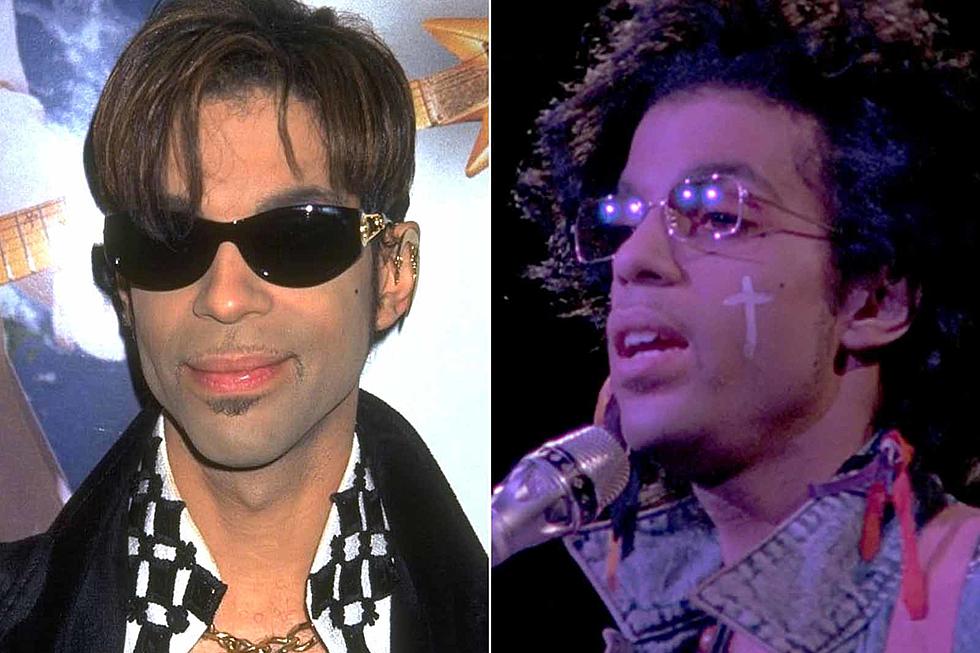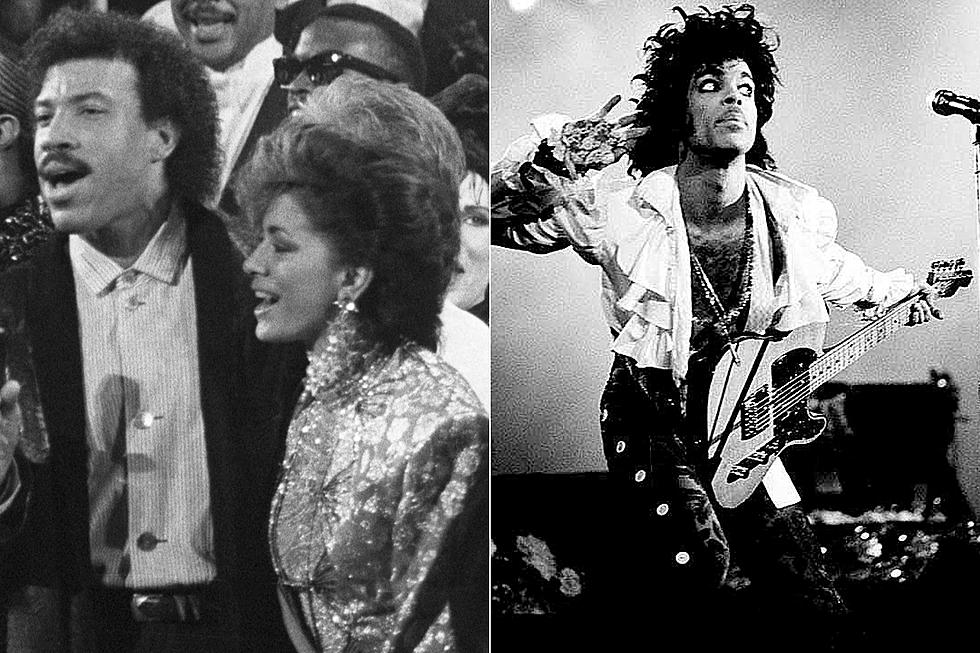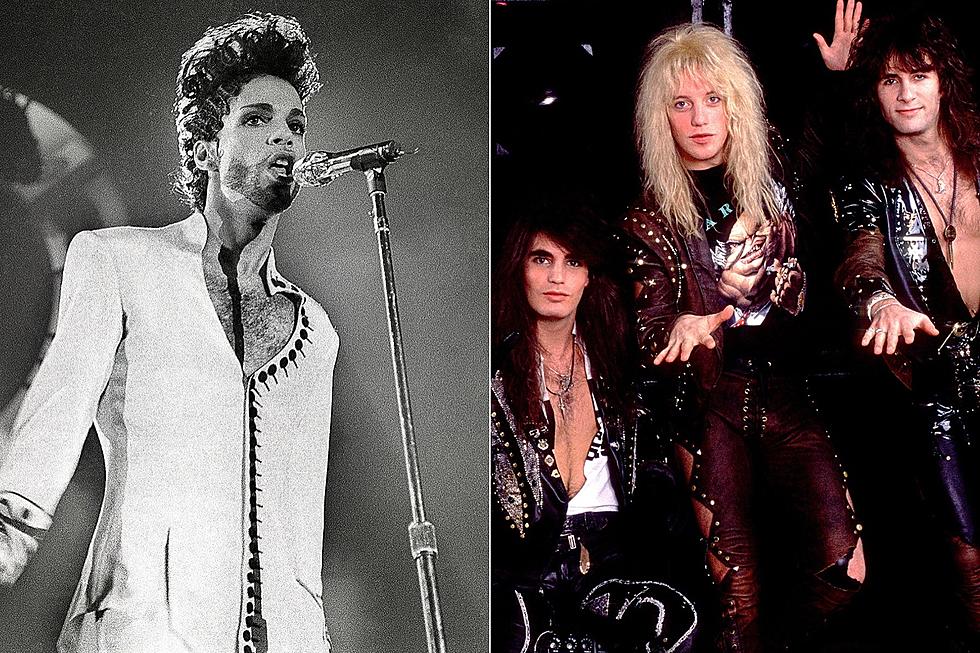
Why Did Prince’s ‘The Cross’ Become ‘The Christ?’
Prince's conversion to the Jehovah's Witnesses faith caused him to stop swearing and performing his most sexually explicit songs. For others, he simply changed the lyrics to reflect his new outlook, including the Sign O' the Times song "The Cross," which he changed to "The Christ."
Unlike other Christian denominations, Jehovah's Witnesses don't recognize the cross. For starters, they believe that Jesus wasn't crucified, but rather impaled on an upright stake, due to their interpretation of the Greek word "stauros" in the Bible. Furthermore, they feel the use of the cross as a symbol is a violation of God's word, that the earliest Christians didn't use one in their worship and that it has its origins in paganism.
Although Prince didn't become a Jehovah's Witness until the early '00s, in the years leading up to it he was discussing religion frequently with former Sly & the Family Stone bassist Larry Graham, who converted in the '70s. “We started studying the Bible on a regular basis,” Graham explained to the Star-Tribune in 2016. “And the more he learned, the more questions he had, like: ‘Why are we here? Where is everything heading? What’s the future for mankind, for the Earth?’"
Prince told Billboard, "the more he said, the more I realized the truth."
Prince – then going by "the Artist" – performed "The Christ" with Graham and Chaka Khan on the Essence Awards in 1998, introducing the song by preaching to the crowd. "Stauros: By definition, a wooden stake driven in the ground, used to cause torture or death," Prince said. "Stauros — perhaps someone lied about the way someone died."
Shortly after the broadcast, Prince and Graham appeared on Vibe, where Sinbad asked Prince to elaborate on what he said.
"Originally, when I'd written the song," Prince said, "I must admit I was a little fearful to call it 'The Christ.' And my good friend Larry hipped me to some things, and it woke me up."
Graham then took over, adding that it came about as a result of the Bible conversations they were regularly having. "And this one particular Bible discussion we were having had to do with stauros," he said, "which is an upright stake or pole, because the discussion was about how, well, as he said in the song, perhaps someone lied about the way someone died. As it turned out, we researched everything and came to find out Jesus actually died on an upright stake or pole, like this (gestures with arms up) -- [he] was impaled, as opposed to like this (gestures with arms spread out). So then the question was then, why is it then, you know, people do this or people choose to use this or that. So he chose to want to make it clear what stauros really was and how Jesus was actually put to death, because it's important to understand the truth. And sometimes the truth, it may hurt a little bit sometimes."
In her book, The Most Beautiful: My Life With Prince, Mayte, who was next to Prince on the stage that night, recalled sitting there "with a frozen smile, thinking 'Whoa, whoa, whoa. Hold up. Please,'" when Graham started talking. And she doesn't think she was the only one.
"The audience sat there, silent and confused," she continued. "You could almost hear the eyes glazing over. They were here to see the Artist Formerly Known as Prince. They were here for the music. Now the studio was heavy with that feeling you get when the Jehovah's Witness knocks on your door and you know he already saw your car in the driveway. You don't want to be rude, but -- dang."
She added that she believed it had been set up by Prince and Graham in advance, because otherwise Prince wouldn't have allowed his bassist to take over. While she respected Graham's skill as a musician, as he took a greater role in Prince's life, she felt isolated because she wasn't comfortable during the discussions.
"I tried to participate in the study sessions, but it simply wasn't my truth," she said. "Men and women studied separately, and I believe faith should bring people together. I believe birthdays are beautiful. I believe all good people will be rewarded in the end."
The Rainbow Children, the first album after reclaiming his name, deeply explored some of Prince's new religion's themes. First wife Mayte Garcia, whom Prince divorced a few years earlier, was believed to be the "banished woman" in the 2001 record's title track.
Once his conversion was completed, Prince regularly attended services at the Kingdom Hall in the Minneapolis suburb of Minnetonka, Minn – a short drive from the lake whose waters, as he told Apollonia in Purple Rain, had purifying capabilities. He also frequently went door-to-door trying to bring others into the faith.
Prince was known to his other followers simply as Brother Nelson, and was remembered as a "mild spirit."
Prince Magazine Ads Through the Years: 1978-2016
More From Ultimate Prince









